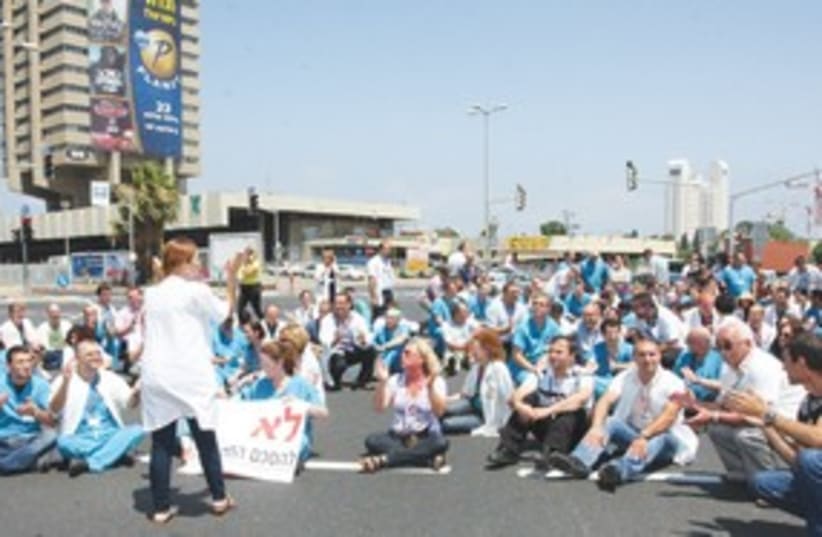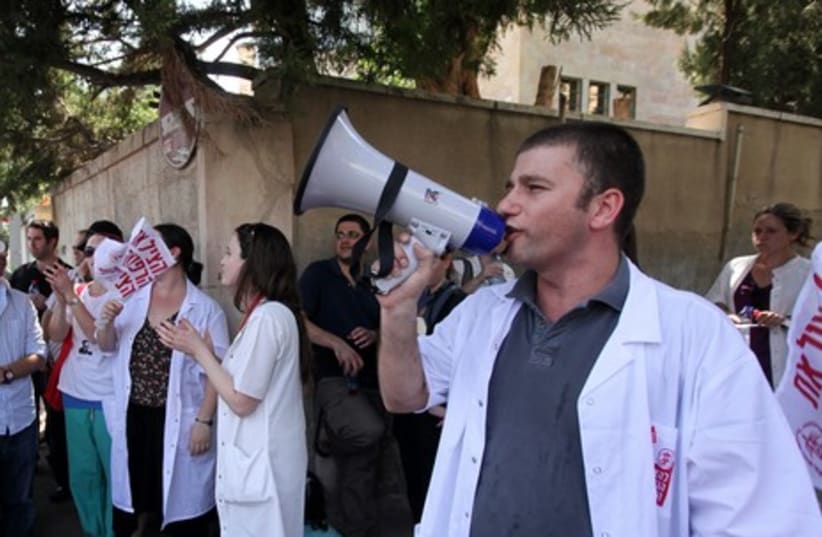
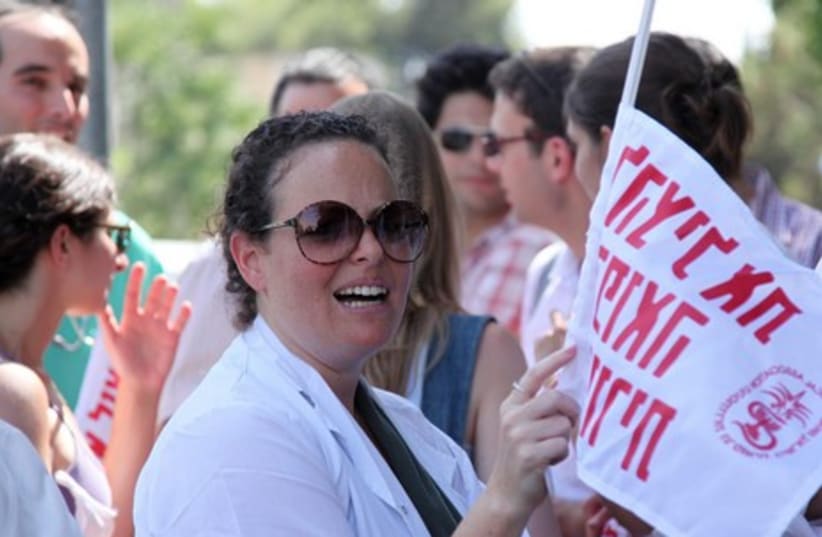
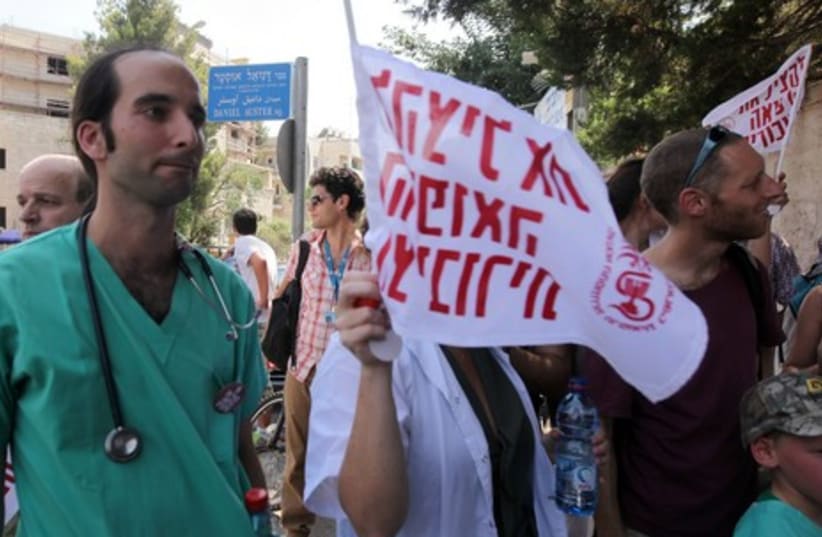
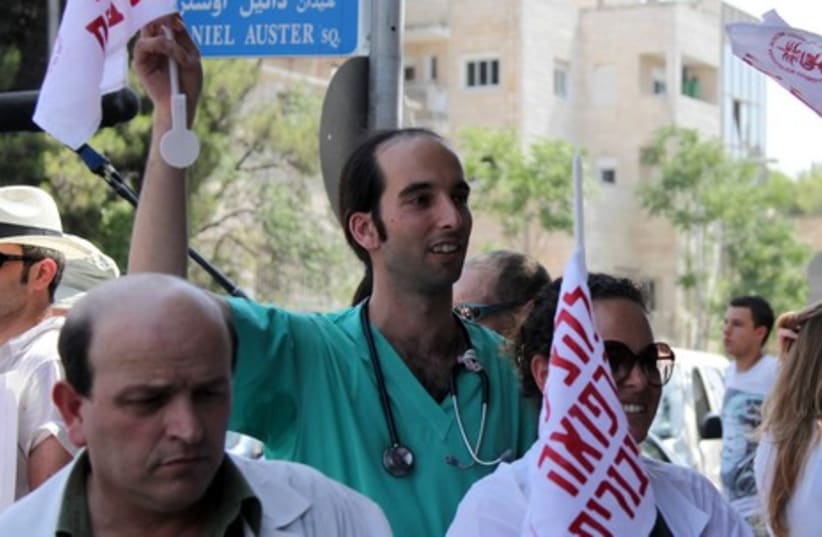
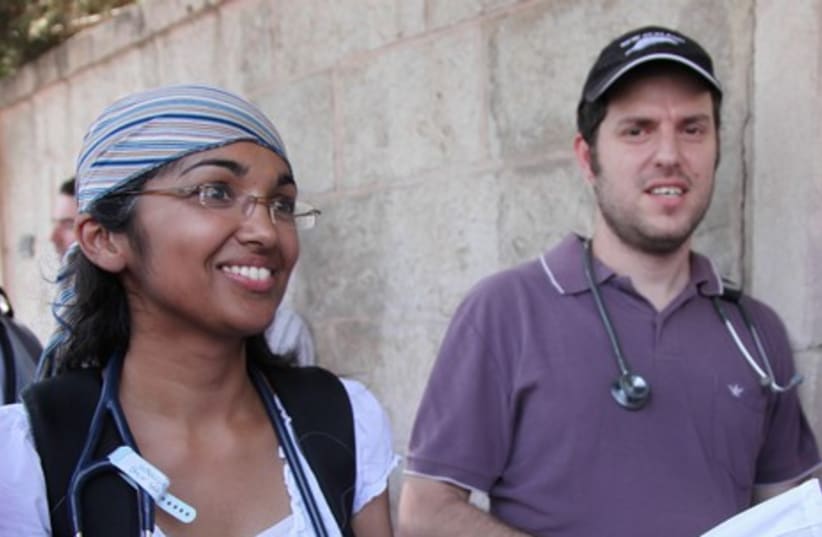

He plans to begin his hunger strike on Thursday, following a four-day march from Ramat Gan to Jerusalem with some 20 doctors, which he began on Monday.RELATED:Treasury says doctors must accept arbitrationMedical students join doctors', residents' protestEidelman, an anesthesiologist, took the unusual step after the National Labor Court informed him early Monday morning that it would not issue restraining orders against the IMA at this time because its sanctions have been “reasonable” and carried out in proportion to its complaints.The IMA chairman said the court, presided over by Judge Nili Arad, made it clear that “justice is on our side.”“To every patient, nurse and doctor it is clear that the health system is collapsing,” Eidelman said. “Unfortunately, the state has abandoned medicine, patients and the physicians. But where are you, Mr. Prime Minister and Health Minister? The decline has been going on for years, and the shortage of doctors and the difficulties have been getting worse every year. But it has come close to catastrophe on your watch.”Eidelman said Netanyahu had the power to halt the decline by immediately adding 1,000 manpower slots for doctors, although he did not say where these physicians would come from. Reducing the number of night and weekend shifts by medical residents to six monthly – about half of the current number – and finding ways to increase doctors in specialties with meager medical manpower would also stop the decline.He also suggested attracting physicians to the periphery, where the level of medicine is considerably lower; and increasing doctors’ wages by 50 percent an hour.“Where has Health Minister Netanyahu disappeared?” Eidelman asked. “Look into the patients’ eyes. Look in the eyes of the doctors, in the eyes of the residents. Carry the heavy burden. Today, not tomorrow.”Eidelman began his four-day march at 4 p.m. on Monday; on Tuesday he will be at the Latrun interchange; on Wednesday he will stay overnight at Moshav Beit Zayit; and on Thursday he will ascend to Jerusalem.Once in the capital, IMA leaders will march to the Prime Minister’s Office, where they hope to leave a petition signed by tens of thousands of physicians and others who support the struggle for a better health system. Eidelman is expected to hold his hunger strike in a tent opposite the Prime Minister’s Office starting Thursday.Deputy Finance Minister Yitzhak Cohen replied in a Treasury press release that it had “agreed with the doctors on a solution to the problem of the periphery and the fields with too-little manpower, but the IMA went back on the agreement.“Leadership is judged according to decisions at times of crisis, but the failures of the doctors’ leadership brought about a situation in which those who will decide in the IMA are strong hospital doctors in the center of the country who are interested in private medical services,” Cohen continued.Cohen maintained the Treasury had already agreed to raising doctors’ wages by more than 36%. He also said that while the Treasury had suggested inviting the residents to join the wage negotiations from the beginning, the IMA refused.“Now they are taking advantage of the residents’ fury because they were not included to revoke their promises to improve public medicine,” he said.The Treasury said an agreement can be reached immediately if the doctors consent to using a time clock, for which those who spend more hours in hospitals will be paid overtime; if senior doctors agree to shifts in the afternoons and evenings; and if more resources are shifted to young residents, instead of senior physicians.Meanwhile, the IMA declared more sanctions, with only urgent and oncological surgery on Tuesday. On Wednesday, hospital- outpatient clinics, day hospitals and diagnostic institutes will close. And on Thursday, only urgent and oncological surgery will be performed.MK Rachel Adatto (Kadima), who is a gynecologist by training, said Netanyahu, “who only at the cabinet meeting asked his ministers to help carry the stretcher, forgot that there is nowhere to evacuate the wounded. The hospitals are closed and the doctors striking.“His complete disregard of the crisis for 128 days leaves the health system bleeding and in critical condition,” she continued.“He must stop hiding behind representatives of the Treasury and the Health Ministry and show real leadership.“There is no room for solutions, like bringing supertankers [that he quickly ordered from abroad after the disastrous Carmel Forest fire broke out]. The health system needs budgets that only the prime minister has the authority to allocate.”Deputy Prime Minister and Interior Minister Eli Yishai, meanwhile, took the unusual step of calling on Netanyahu to intervene in the doctors’ dispute.“This is a life-and-death matter,” he told Netanyahu, adding that only he can bring the strikes to an end. The public can’t bear the crisis anymore. The social-economic cabinet that Netanyahu heads must convene for marathon sessions with representatives of the doctors to bring the strikes to a close,” Yishai added.The Prime Minister’s Office responded to Yishai’s letter urging his involvement in the doctor’s strike by saying that Netanyahu has continuously been briefed on the status of the negotiations by the finance minister, the Treasury’s director of wages and the deputy health minister. But the Prime Minister’s Office’s statement said Netanyahu cannot conduct the negotiations in their place.“Now, when it looks like the sides are not getting closer to concluding an agreement – but rather getting farther apart – the director-general of the Prime Minister’s Office will meet with them tomorrow.”
